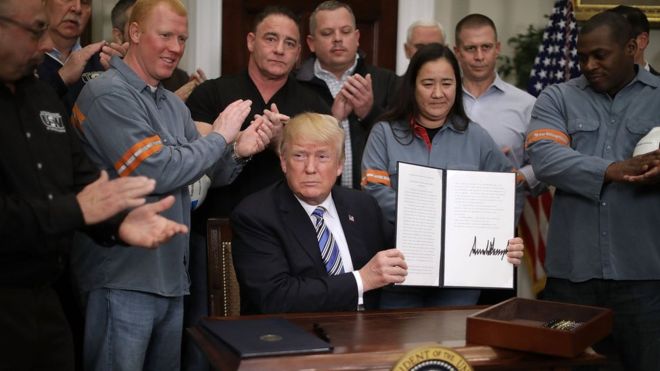
There’s a Sands Casino where the Bethlehem Steel Corp. once stood. The casino was completed in 2009, just 8 years after the 100-year-old steel company filed bankruptcy. Ironically, the biggest obstacle facing the casino’s developer was a shortage of structural steel. Even more ironically, the developer ended up buying it from Nucor Corp., the onetime “minimill” competitor that Bethlehem executives scoffed at decades earlier for the startup’s embrace of electric arc furnace technology.
I still remember dragging Bethlehem-labeled bar stock from the steel truck onto the loading dock when I was in my early 20s.
There was plenty of Alcoa bar stock coming off the truck back then as well. Yet according to the investment management group Morningstar’s website, total executive compensation at Alcoa more than tripled between 2014 and 2016, at a time when the aluminum giant was busy closing plants in New York, Texas and elsewhere.
Similar stories can be told about United States Steel Corp., Wisconsin Steel and ArcelorMittal. … The list goes on.
Steel has a long and colored history, and I’ve always enjoyed reading about it. Maybe it’s because my dearly departed mother told me at a young age that I’m related to William Kelly (her maiden name), the man who invented the Bessemer steel process and who, thanks to his poor skills as a businessman and no small amount of steel industry politics, was subsequently cheated out of his patent.
Or maybe it’s the fact that I, like so many of you reading this, have made a career in the metalworking industry. Either way, I have mixed feelings about the recently announced steel and aluminum tariffs.
I admit, I’m a protectionist at heart. I agree with our president to some extent when he says the United States is treated unfairly. But I also think that this is in large part due to our politicians’ silly, self-centered games and the fact that so many of them have spent their careers letting the foxes into the hen house for their own self-gain.
Still, America first. Of course.
At the same time, I think that the steel industry has acted stupidly. After World War II, Bethlehem Steel, U.S. Steel and other industry leaders sat on their quarterly earnings statements while companies in Europe and Japan were busy embracing new steel-making technologies. China soon followed their lead.
As with so many aspects of life in corporate America, profits and shareholder interests trump (pun intended) long-term thinking. Investment in employees and infrastructure stagnates, new technology is ignored, and America falls behind.
I’m no economist, nor am I an expert on international trade; I could be all wet on this. But I remember when George W. tried tariffs. He rolled them back the following year after our country’s GDP started to tank. Reagan and Carter saw similar “success” with their protectionist trade policies. Clinton gave us NAFTA.
Fast forward to our current president’s latest announcement. I won’t get into the Canada and Mexico part of the discussion, countries that are apparently tariff-free but enjoy being numbers one and four on the “Let’s sell steel to the U.S.” list. Nor will I go into Commerce Secretary Wilbur Ross and the massive amounts of money he earned when his investment group sold domestic steel companies to foreign investors. (Bethlehem Steel was one.)
But I will say that this latest round of tariffs appears to be more about political chest-beating (never mind some strategic pocket-lining) than national security.
And while I mourn the gutting of domestic steel production and wish that America could have a do-over, I wonder if it’s too late. Maybe we should let Big Steel fail and enjoy the fruits of the smaller, more agile, more technically advanced companies that will surely take their place. Healthy competition is always a good thing, even though it might sting for a while.
Related Glossary Terms
- metalworking
metalworking
Any manufacturing process in which metal is processed or machined such that the workpiece is given a new shape. Broadly defined, the term includes processes such as design and layout, heat-treating, material handling and inspection.
- sawing machine ( saw)
sawing machine ( saw)
Machine designed to use a serrated-tooth blade to cut metal or other material. Comes in a wide variety of styles but takes one of four basic forms: hacksaw (a simple, rugged machine that uses a reciprocating motion to part metal or other material); cold or circular saw (powers a circular blade that cuts structural materials); bandsaw (runs an endless band; the two basic types are cutoff and contour band machines, which cut intricate contours and shapes); and abrasive cutoff saw (similar in appearance to the cold saw, but uses an abrasive disc that rotates at high speeds rather than a blade with serrated teeth).

